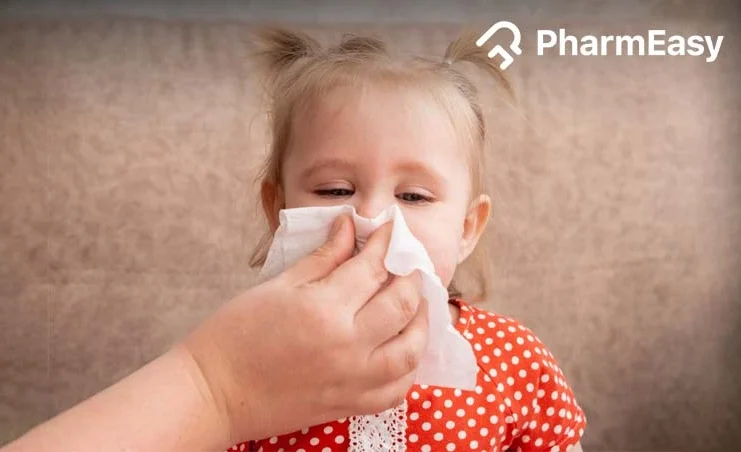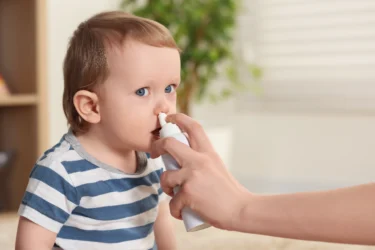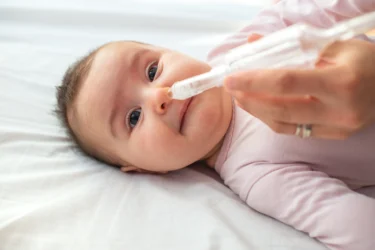Home Remedies for Cold in Infants and Babies
By Dr. Anmol Batra +2 more

Get,

to manage your symptom
Get your,


4 Cr+ families
benefitted

OTP sent to 9988776655



You’ve successfully subscribed to receive
doctor-approved tips on
Whatsapp

Get ready to feel your best.

Hi There,
Download the PharmEasy App now!!


Register to Avail the Offer
Send OTPBy continuing, you agree with our Privacy Policy and Terms and Conditions

Hi There,
Sign up on PharmEasy now!!
Trusted by 4 crore+ families

OTP sent to 9988776655



You have unlocked 25% off on medicines




Code: NU25
By Dr. Anmol Batra +2 more
Table of Contents
Colds are one of the most common illnesses in young children, especially infants and babies. They may occur due to conditions like infections (viral or bacterial) affecting the nose, throat, or sinuses. Individuals with allergies may also have cold-like symptoms, for example, stuffy or runny nose, sneezing, and watery-itchy eyes1,3.
Because there are over a hundred different cold viruses, young children (whose immunity is still developing) often catch several colds each year. This tends to happen more often during the fall and winter seasons1.

The good news is that, although colds can be frustrating for both parents and babies, they are usually mild, self-limiting, and clear up on their own within one to two weeks2. This period can be uncomfortable for infants, but simple home remedies may help ease symptoms and support natural recovery.
With this guide, we aim to help parents by providing safe and effective home remedies for colds in babies and infants.
Many parents wonder, “how long do infant colds last?” Colds in infants and babies usually develop gradually and can last from one to two weeks. However, some symptoms, such as a cough, may last a little longer. The most common symptoms of a cold include1:
Some babies may also exhibit a reduced appetite, more tiredness than usual, or develop a mild headache. A low-grade fever (below 38.5°C) may also occur1,2.
Usually, all these symptoms are minor and self-limiting. However, because infants and babies have developing immunity, infections that cause mild colds in older children and adults may lead to more serious illnesses in them, for example1:
It is also important to distinguish a cold from the flu. While the two can seem similar, the flu usually begins suddenly and is associated with high fever, chills, body aches, and extreme tiredness. In contrast, colds tend to develop more slowly and are generally milder. Another important point that will help distinguish between the two is that children with colds often still have the energy to play, whereas those with influenza are more likely to be confined to bed2.
Colds in infants and babies are most often caused by viruses that infect the lining of the nose and throat, leading to inflammation and symptoms.
Certain risk factors, such as the following, increase the risk of colds in babies1:
Many parents ask, “how to treat infant cold?” Coughing is a normal part of a cold and helps the body clear mucus from the airways.
While colds usually resolve on their own, certain home remedies for cold in babies can ease symptoms and make babies and children more comfortable. Some non-drug remedies recommended for cold relief include4,5:

Helps reduce congestion and makes breathing easier. Avoid warm mist humidifiers, as they may worsen swelling in the nasal passages.

These keep the nasal passages moist, as well as help clear stuffiness.

Using a bulb syringe or similar tool (with or without saline drops) is especially helpful for infants under one year.
Most colds in babies are mild and go away on their own, but the symptoms can make your little one uncomfortable. You can help your baby feel better with these simple home remedies for cold in babies while their body fights the infection5:
While colds are common in young children, parents can take simple steps to reduce the risk of infection and the spread of germs. Some practical prevention tips include1:
Most colds are mild, harmless, and clear up on their own without lasting effects. However, in some cases, complications may occur, including2:
Also Read: Caring for a Baby with Blocked Nose: Simple Tips for Parents
Most colds get better on their own, but sometimes medical attention is needed. Seek immediate medical care in the following cases1,4:
For infants under 6 months:
For babies and children of all ages, call your doctor or go to the emergency department if your child:
These symptoms may indicate pneumonia or bronchiolitis and require immediate medical treatment.
Contact the doctor if your child shows signs of an ear infection, such as:
Other signs that indicate your child should visit a doctor include:
Also Read: Green Poop in Babies: Causes, When to Worry, and What Parents Should Know
Colds are very common in babies and usually clear up on their own with time, rest, and supportive home care. While most symptoms are mild, it is important for parents to know how to ease discomfort, prevent the spread of infection, and recognise warning signs that need medical attention.
Remember, with proper care and attention, your baby can recover safely and comfortably.
Also Read: Baby Loose Motion: Causes, Home Remedies, and Effective Ways to Stop It Fast
It is normal for young children to catch 6 to 10 colds per year, especially during colder months2.
Yes, some cough and cold medicines can pass into breast milk and may cause adverse reactions in breastfed infants5. Always inform your doctor or pharmacist if you are breastfeeding, so they can recommend safer alternatives.
Zinc may help inhibit viral growth. However, there is no proven benefit. Therefore, at present, the use of zinc for treating cough and cold in children is not recommended7.
Paracetamol or ibuprofen may be used in babies to relieve fever, aches, and pain, but they do not cure the cold itself. These medicines only make your baby more comfortable while the body fights the infection. Always consult your doctor for the correct/age-appropriate dose and follow the instructions on the product label carefully4.
No, throat lozenges or cough drops are unsafe for children under 4 years as they pose a choking hazard5.
No, colds are caused by viruses, so antibiotics are not effective. Antibiotics should only be used (under the guidance of a doctor) if a child develops a bacterial infection, such as an ear infection or pneumonia1.
Vitamin C does not significantly improve cold symptoms in children, but it may help to slightly reduce the duration of colds6. There is no clear recommended dose, and potential drug interactions or side effects are not well established. So, it should not be relied upon as a primary treatment, and parents should focus on safe home care and symptom relief instead.
Disclaimer: The information provided here is for educational/awareness purposes only and is not intended to be a substitute for medical treatment by a healthcare professional and should not be relied upon to diagnose or treat any medical condition. The reader should consult a registered medical practitioner to determine the appropriateness of the information and before consuming any medication. PharmEasy does not provide any guarantee or warranty (express or implied) regarding the accuracy, adequacy, completeness, legality, reliability or usefulness of the information; and disclaims any liability arising thereof.
Links and product recommendations in the information provided here are advertisements of third-party products available on the website. PharmEasy does not make any representation on the accuracy or suitability of such products/services. Advertisements do not influence the editorial decisions or content. The information in this blog is subject to change without notice. The authors and administrators reserve the right to modify, add, or remove content without notification. It is your responsibility to review this disclaimer regularly for any changes.
Comments

Leave your comment...
You may also like
Comments